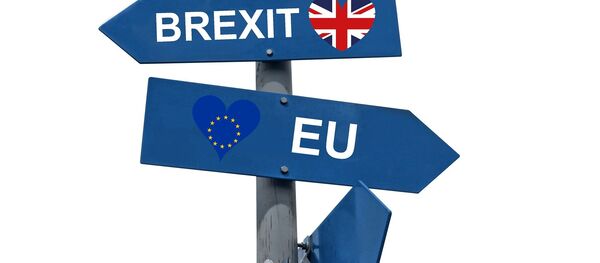Kristian Rouz — Avid Brexiteers accuse the International Monetary Fund (IMF) of supporting anti-Brexit sentiments in its most recent analysis of the UK's possible "no-deal" separation from the EU. This comes after the Fund released a report warning of substantial costs to the British economy in case the Brexit talks with Brussels fall through.
In a new report, the IMF said the British GDP growth rate could slow to 1.5 percent per year this year and next, and this drag of economic expansion could put the UK at a disadvantage to Germany and France in international economic relations.
"I'm a desperate optimist, and I very much hope and pray that there will be a deal between the European Union and the UK," Christine Lagarde, IMF managing director, said.
Brexit supporters said the IMF's report comes in line with what they call "Project Fear" — a set of pro-EU narratives focusing on the assumptions that the UK's separation from the bloc would greatly impede the British economy.
READ MORE: Labour Constituents Overwhelmingly Back Vote on 2nd Brexit Referendum — Reports
"Did they learn nothing from their loss of credibility after Project Fear Mark 1? In other words, stop making bold claims when you really don't know what will happen," Ruth Lea of Arbuthnot Banking Group said.
However, the British economy has shown resilient growth and an expansion in manufacturing and exports ever since — developments hailed by hardline Brexiteers as refuting "Project Fear" narratives.
Nonetheless, many Labour MPs and pro-EU enthusiasts have ramped up their efforts to thwart Brexit in recent months — mainly due to the disagreements within the Conservative and Unionist cabinet over whether a Brexit deal with the EU is "to be or not to be."
READ MORE: IMF Reveals Actual Data on Russia's GDP Growth Projection
Chancellor of the Exchequer Philip Hammond said the cabinet of Prime Minister Theresa May must address the newest warnings from the IMF of a "no-deal" Brexit possible hurting the UK's economic growth.
"The IMF are clear today that no deal would be extremely costly for the UK as it would also for the EU, and that despite the contingency actions we're taking, leaving without a deal would put at risk the substantial progress the British people have made over the past 10 years in repairing our economy," Hammond said.
For their part, the May cabinet said either a deal with the EU would come in line with the prime minister's so-called Chequers proposals, or there would be no deal at all. Tories on the right have criticized PM May's proposals as likely keeping the UK too close to the EU and possibly impeding Albion's ability to negotiate future trade deals with non-EU partners.
"I think that the alternative to that will be having no deal," Prime Minster May said, as her cabinet has recently started working on a "hard Brexit" scenario as well.
Whilst Brexit is due in March 2019, recent UK macroeconomic data has pointed to acceleration in GDP growth. The ONS said the economy expanded 0.6 percent quarter-on-quarter between May and July, at almost its quickest pace in roughly a year.
READ MORE: Tory MP Says Chequers Deal 'Dead' as Barnier Slams May's Brexit Proposal
In this light, Brexit appears to be driven primarily by the aspirations of the working class of the English North — whose shift from supporting the New Labour towards embracing the likes of UKIP and Boris Johnson is raising the prospect of a populist overhaul within the Conservative Party itself.







